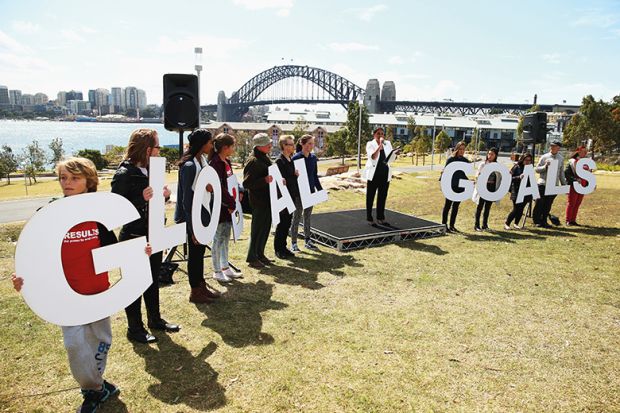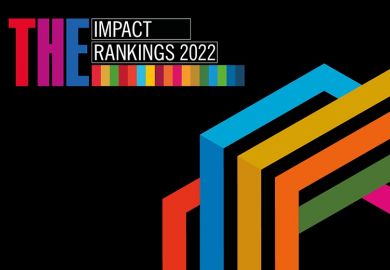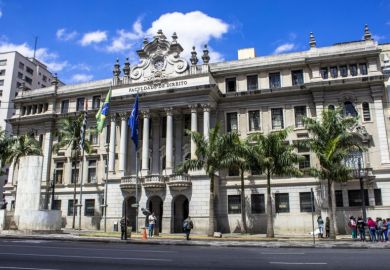Browse the full Impact Rankings 2022 results
Oceania has stolen back the impact crown as Western Sydney University claims the number one spot in the fourth edition of Times Higher Education’s Impact Rankings.
The Australian university leads the overall THE Impact Rankings 2022, the world’s only ranking measuring universities’ contributions to the United Nations’ Sustainable Development Goals. In second place is Arizona State University (Tempe) in the US, followed by Canada’s Western University.
In joint fourth position are two universities from emerging economies: King Abdulaziz University in Saudi Arabia and Malaysia’s Universiti Sains Malaysia.
No one country dominates the top 10: two spots go to UK universities, two to Canadians, and one each to universities in Australia, Japan, Malaysia, New Zealand, Saudi Arabia and the US.
The highest ranked UK institution is Newcastle University at eighth place, followed by the University of Manchester in ninth. Overall, the UK has the most universities in the top 100 at 20. Australia is close behind with 17 in the top 100, followed by 16 in Canada and seven in New Zealand.
THE Impact Rankings 2022: the top 10
| 2022 rank | Institution | Country/region | Score |
| 1 | Western Sydney University | Australia | 99.1 |
| 2 | Arizona State University (Tempe) | United States | 98.5 |
| 3 | Western University | Canada | 97.8 |
| =4 | King Abdulaziz University | Saudi Arabia | 97.5 |
| =4 | Universiti Sains Malaysia | Malaysia | 97.5 |
| 6 | University of Auckland | New Zealand | 96.7 |
| 7 | Queen’s University | Canada | 96.6 |
| 8 | Newcastle University | United Kingdom | 96.5 |
| 9 | University of Manchester | United Kingdom | 96.4 |
| 10 | Hokkaido University | Japan | 96.2 |
Universities can submit data to be measured against any of the goals, and any university that provides data on SDG 17 (partnerships for the goals) and at least three other SDGs is included in the overall ranking. A university’s final score in the overall table is calculated by combining its score in SDG 17 with its top three scores out of the remaining SDGs.
This year, 1,406 universities from 106 different countries/regions are ranked in the overall table, up from 1,117 institutions from 94 territories last year.
THE Campus Spotlight: How universities can work towards the SDGs
Leading institution Western Sydney University has an overall score of 99.1 out of a possible 100, and has a particularly high score for SDG 6 (clean water and sanitation), which measures universities’ research related to water, their water usage and their commitment to ensuring good water management in the wider community. The university also performs well for SDG 12 (responsible consumption and production), which measures universities’ research on this topic and their approach to the sustainable use of resources.
Barney Glover, vice-chancellor of Western Sydney, said that when it came to tackling global problems, “universities play a crucial role, primarily in ensuring that we generate graduates that can contribute to the development of solutions and responses to those global challenges”.
“Education programmes, [whether they are] degree programmes, short courses, postgraduate programmes or microcredentials...they all should be informed by the UN SDGs,” he said.
Universities also “are without doubt the most important repository of research capability in many of the countries of the world that are grappling with these challenges”, he said. “Universities are uniquely placed to do this; we are by far and away the most important part of the solution.”
Collaboration was key, Professor Glover added. “If we are arrogant enough to believe that we can make a difference to the complex problems we’re facing without collaborating, without bringing the best together to think through, to analyse, to synthesise and to strategise, then I think we are going to let down generations to come,” he said.
He urged vice-chancellors around the world to do more to support sustainable development, saying that “there are too many of the very strong and powerful universities in the world that are not recognised” in the Impact Rankings. Less than half of the universities in the latest edition of the research-focused World University Rankings are ranked in the overall Impact table.
“What are they doing? Why aren’t they taking this more seriously as a reflection of their commitment to the sustainable development goals, to the planet?” he asked.
Alan Shepard, president and vice-chancellor of Western University, which achieves particularly high scores for SDG 1 (no poverty) and SDG 2 (zero hunger), said that universities needed to take a leadership role in practising and promoting sustainability.
“Western is proud to be among those institutions making a difference,” he said.
“We’re working hard to entrench sustainability across our operations. Our researchers are working to create healthier watersheds, develop super-efficient battery technologies, and discover better ways for businesses to operate sustainably. More than ever, our students are learning how sustainability intersects with their areas of study.”
rosa.ellis@timeshighereducation.com
Top universities by SDG
SDG 1 – No poverty
Western University (Canada)
Research on poverty and support for students from poor families
SDG 2 – Zero hunger
Hokkaido University (Japan)
Research on hunger, teaching on food sustainability and commitment to tackling food waste and hunger on campus and locally
SDG 3 – Good health and well-being
Iran University of Medical Sciences (Iran)
Research on key diseases and conditions, support for healthcare professions and health of students and staff
SDG 4 – Quality education
Aalborg University (Denmark)
Contributions to early years and lifelong learning and commitment to inclusive education
SDG 5 – Gender equality
Chiang Mai University (Thailand)
Research and policies on gender equality and commitment to recruiting and promoting women
SDG 6 – Clean water and sanitation
Western Sydney University (Australia)
Research related to water, water usage and commitment to ensuring good water management in wider community
SDG 7 – Affordable and clean energy
Fudan University (China)
Energy research, energy use and policies, and commitment to promoting energy efficiency
SDG 8 – Decent work and economic growth
University of the Witwatersrand (South Africa)
Economics research, employment practices and share of students taking work placements
SDG 9 – Industry, innovation and infrastructure
University of British Columbia (Canada), Technical University of Munich (Germany) and University of Twente (Netherlands)
Research on industry and innovation, number of patents and spin-off companies and research income from industry
SDG 10 – Reduced inequalities
University of Canberra (Australia)
Research on social inequalities, policies on discrimination and commitment to recruiting staff and students from under-represented groups
SDG 11 – Sustainable cities and communities
Arizona State University (Tempe) (US)
Research on sustainability, role as custodians of arts and heritage and internal approaches to sustainability
SDG 12 – Responsible consumption and production
University of Canterbury (New Zealand)
Research on responsible consumption and approach to the sustainable use of resources
SDG 13 – Climate action
University of Tasmania (Australia)
Research on climate change, use of energy and preparations for dealing with consequences of climate change
SDG 14 – Life below water
Arizona State University (Tempe) (US)
Research on life below water and education on and support for aquatic ecosystems
SDG 15 – Life on land
Arizona State University (Tempe) (US)
Research on life on land and education on and support for land ecosystems
SDG 16 – Peace, justice and strong institutions
Universiti Sains Malaysia (Malaysia)
Research on peace and justice, participation as advisers for government and policies on academic freedom
SDG 17 – Partnerships for the goals
University of Liverpool (UK) and Universiti Sains Malaysia (Malaysia)
The broader ways in which universities support the SDGs through collaboration with other countries, promotion of best practices and publication of data
Methodology
The THE Impact Rankings include metrics based on all 17 of the UN Sustainable Development Goals across four broad areas: research, stewardship, outreach and teaching.
Universities can submit data on as many of the SDGs as they are able. SDG 17 is the only compulsory SDG for inclusion in the overall table.
A university’s final score in the overall table is calculated by combining its score in SDG 17 with its top three scores out of the remaining 16 SDGs. SDG 17 accounts for 22 per cent of the overall score, while the other SDGs each carry a weighting of 26 per cent. This means that different universities are scored based on a different set of SDGs, depending on their focus.
The score from each SDG is scaled so that the highest score in each SDG in the overall calculation is 100 and the lowest score is 0.
Universities must submit their own institutional data to be ranked. Bibliometric data come from Elsevier.
Deeper analysis of the THE Impact Rankings data is available via THE’s SDG Impact Dashboard.
POSTSCRIPT:
Print headline: A commitment to the planet’s future
Register to continue
Why register?
- Registration is free and only takes a moment
- Once registered, you can read 3 articles a month
- Sign up for our newsletter
Subscribe
Or subscribe for unlimited access to:
- Unlimited access to news, views, insights & reviews
- Digital editions
- Digital access to THE’s university and college rankings analysis
Already registered or a current subscriber?







